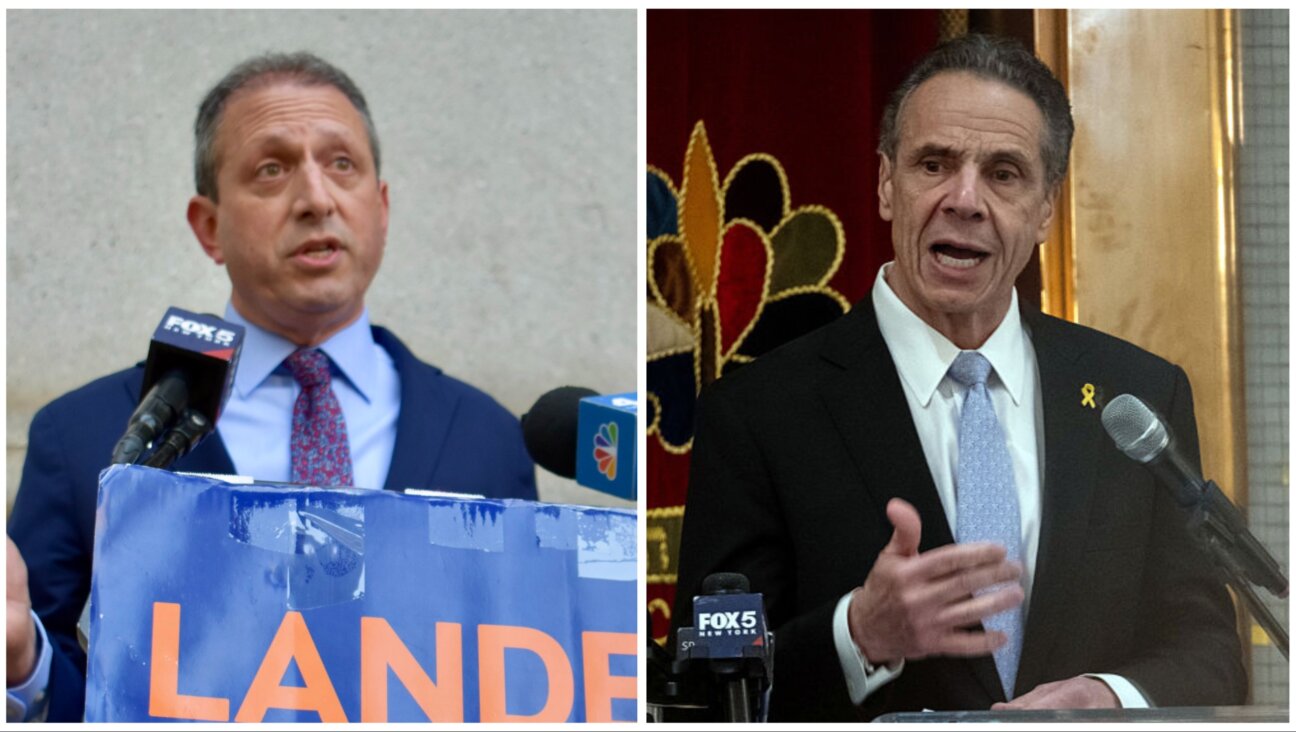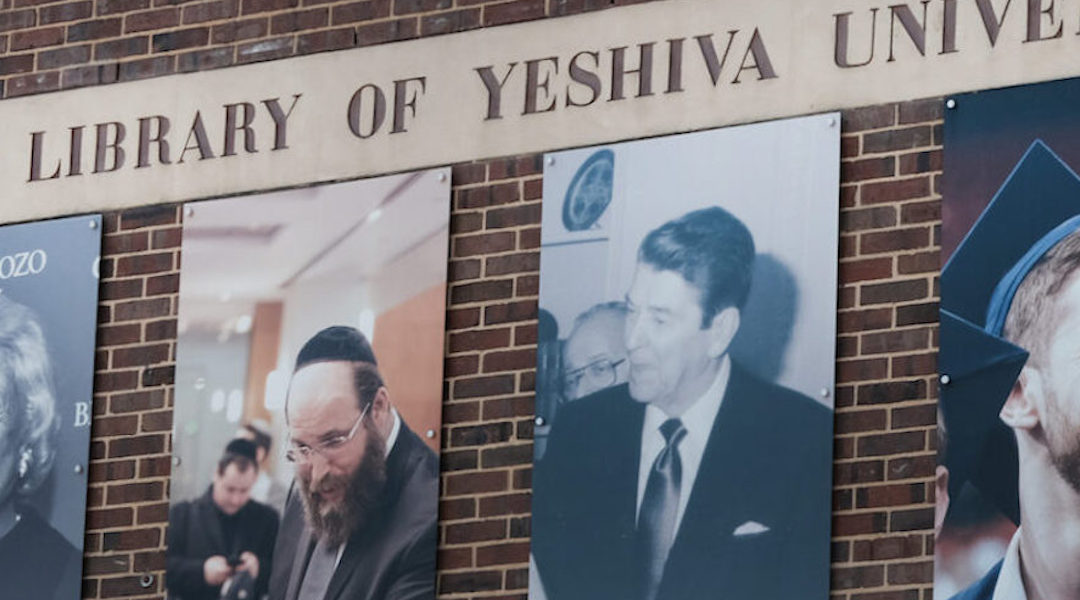Unions in Britain, Canada Urge Boycotts Against Israel
In a serious setback to Israel’s diplomacy and public relations, two major unions — one in Britain and one in Canada — voted this week to urge boycotts of the Jewish state, with one targeting university professors and the other calling for economic divestment.
In England, the country’s largest union of higher education instructors, the National Association of Teachers in Further and Higher Education, voted Monday to recommend that their 67,000 members consider severing ties with Israeli professors and academic institutions that do not “publicly disassociate themselves” from “continuing Israeli apartheid policies.” The resolution passed during the union’s annual conference in Blackpool in a contentious vote of 106-71 with 21 abstentions, according to Trevor Phillips, a press officer for the union.
In Canada, the Ontario branch of the country’s biggest labor union, the Canadian Union of Public Employees, voted unanimously May 27 at its annual convention to urge an economic boycott of Israel. The resolution passed by CUPE Ontario — whose 210,000 members account for nearly half of Canada’s entire national membership — called for divestment, which translates into withdrawing the union’s pension fund investments in Israel.
While economic boycott has long been a tactic leveled against Israel by a host of Arab states, the recent calls for boycott by two major labor unions on both sides of the Atlantic Ocean may be signaling a new form of anti-Israel activism in the West — and one that comes with teeth. It also may be a sign that the stances on Israel once reserved for the extreme left and right wings in Europe and North America are now moving closer to the political center. Critics of the boycott resolutions contend that the new anti-Israel measures being touted from the United Kingdom to Canada represent an ominous development that could open a dangerous new page in the West.
“This is not simply an intense concern for human rights. The extent to which Israel is portrayed as an evil country is pathological; it extends well beyond the policies of the government,” said Shalom Lappin, professor of computational linguistics at King’s College London. Lappin is a member of Engage, an ad hoc coalition of higher education instructors in Britain who have mobilized to counter the union’s boycott resolution. Referring to Israel, he added, “What’s happening now is a rejection of the legitimacy of the country.”
Direct comparisons between Israel and the apartheid state of South Africa have peppered the rhetoric of the unions in both England and Canada, signaling what appears not only to be an attempt to paint Israel as an apartheid state, but also a broader indication that the left is undertaking the kind of tactics leveled at the pro-apartheid South African government in the 1980s. Those tactics successfully isolated the South African government on the world stage, and that is what the recent boycott measures aimed at Israel are intended to do.
The president of CUPE Ontario, Sid Ryan, said that while it’s nothing new for the Canadian labor movement to take a position criticizing Israel for its “apartheid policies,” it is only now that a union has passed a resolution that calls for economic divestment.
“The divestment portion could be quite serious, because in Canada we’ve got major public sector pension plans, many of whom are invested in Israeli bonds and such,” Ryan said, noting that one of the union’s pension funds is valued at $40 billion. Ryan also said that he intends to get other unions on board.
“Once I get to a meeting of the CUPE national executive board, we’ll be asking the directors to bring up the investment policies just like we did in the apartheid days of South Africa,” he said.
In light of the recent Palestinian elections that swept Hamas to power, as well as the Islamic insurgency in Iraq and Afghanistan, some experts see the icy climate in Europe and Canada as a direct outgrowth of terrorist activities carried out by Hamas and other Islamic fundamentalist groups who view the destruction of Israel as a central tenet of their political platforms.
“Islamist terrorism causes people to look for a rational explanation, and they come up with the rational explanation that people have always come up with throughout history — that the Jews are at fault,” said Paul Berman, a journalist who is currently a senior fellow at The New School’s World Policy Institute.
But Khalil Jahshan, former president of the National Association of Arab Americans and now director of Pepperdine University’s Washington internship program, said that the growing pressure on Israel has more to do with the traditional leftwing activists in the West than with militant Palestinian activists or Islamic extremists. Jahshan attributed the new anti-Israel activism to what he called “a diverse group of so-called progressive left of center pro-human rights, pro-Palestinian, anti-occupation liberal, sometimes Jewish faculty members.” He also said that in the United States, attempts to boycott academics may be a retaliation for “what has been done on the Jewish side” by some hawkish pro-Israel activists who previously leveled attacks against academics, both Jewish and Arab, who have criticized Israeli policies.
In England, what began as a series of academic boycott measures aimed at Israel over the past several years by a union representing 50,000 higher education instructors, the Association of University Teachers, snowballed into the resolution passed by NATFHE, the larger union of higher education instructors. Boycott resolutions put forward in 2005 by the AUT were initially passed and then quickly reversed. The resolutions called for boycotting three major Israeli universities for putative human rights violations. Previous measures — one of which stated that anti-Zionism is not antisemitism — were passed in 2003.
The two British unions were expected to officially merge Thursday, effectively nullifying the larger union’s recommendation for academic boycott. Now, the two groups will constitute the University and College Union and will have to agree on policy, setting the stage for a battle between those from both unions who occupy opposing sides of the debate.
In a statement released Tuesday, the AUT said that it “does not endorse this policy and is strongly advising its members not to implement it,” referring to the resolution passed by NATFHE. The statement continued: “It will not support or cooperate in any way with any attempts to implement the NATFHE motion in advance of the first UCU annual national congress in June 2007.”
Despite the AUT’s official anti-boycott position, union members who led the charge for boycotting Israeli universities in 2005 and in previous years say that the merger will bolster their position. Sue Blackwell, who is a lecturer in English at the University of Birmingham and a member of the pro-Palestinian activist group the British Committee for Universities of Palestine, said of the merger, “In terms of the boycott, I think we’ll be able to deliver more consistent and coherent solidarity to our colleagues in Palestine.” Blackwell introduced last year’s AUT motion.
But a leader of the anti-boycott movement, David Hirsh, who is the editor of Engage, contended that the union consolidation would temper the boycott resolutions. “A lot of people are very upset and angry about what happened,” Hirsh said, referring to the vetting of the boycott resolutions. “So,” he continued, “I think this will kick-start a campaign to make people take this seriously.” Still, fellow Engage member Lappin said that the merger actually might embolden the pro-boycott activists and strengthen their position.
The British government weighed in on the debate in a statement issued by British Foreign Office Minister Lord Triesman. “We regret today’s decision by the National Association of Teachers in Further and Higher Education (NATFHE) to vote in favor of boycotting Israeli academics and institutions,” the statement said. It continued: “We believe that such academic boycotts are counterproductive and retrograde. Far more can be obtained through dialogue and academic cooperation.”
In Canada, the Ontario union’s actions sent shockwaves through the leadership of the Jewish community. “Now they’re looking at divestment, and undoubtedly they’ll link up with the academics,” said Frank Dimant, executive vice president of B’nai Brith Canada. “We’re going to have this coalition of anti-Israel, which we thought had gone into the recesses and is coming back to the fore,” he said.
The Forward is free to read, but it isn’t free to produce

I hope you appreciated this article. Before you go, I’d like to ask you to please support the Forward.
At a time when other newsrooms are closing or cutting back, the Forward has removed its paywall and invested additional resources to report on the ground from Israel and around the U.S. on the impact of the war, rising antisemitism and polarized discourse.
Readers like you make it all possible. We’ve started our Passover Fundraising Drive, and we need 1,800 readers like you to step up to support the Forward by April 21. Members of the Forward board are even matching the first 1,000 gifts, up to $70,000.
This is a great time to support independent Jewish journalism, because every dollar goes twice as far.
— Rachel Fishman Feddersen, Publisher and CEO
2X match on all Passover gifts!
Most Popular
- 1

News A Jewish Republican and Muslim Democrat are suddenly in a tight race for a special seat in Congress
- 2

Fast Forward The NCAA men’s Final Four has 3 Jewish coaches
- 3

Film & TV What Gal Gadot has said about the Israeli-Palestinian conflict
- 4

Fast Forward Cory Booker proclaims, ‘Hineni’ — I am here — 19 hours into anti-Trump Senate speech
In Case You Missed It
-
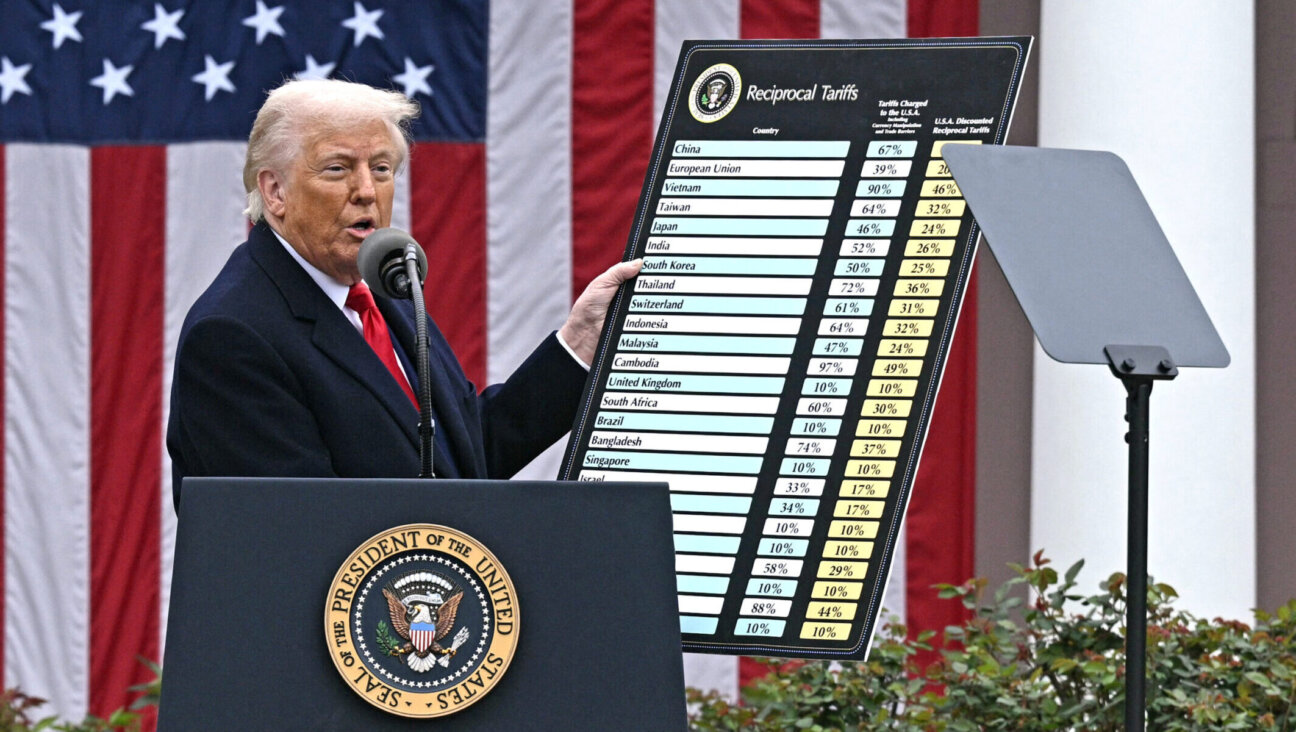
Fast Forward Trump’s ‘Liberation Day’ includes 17% tariffs on Israeli imports, even as Israel cancels tariffs on US goods
-
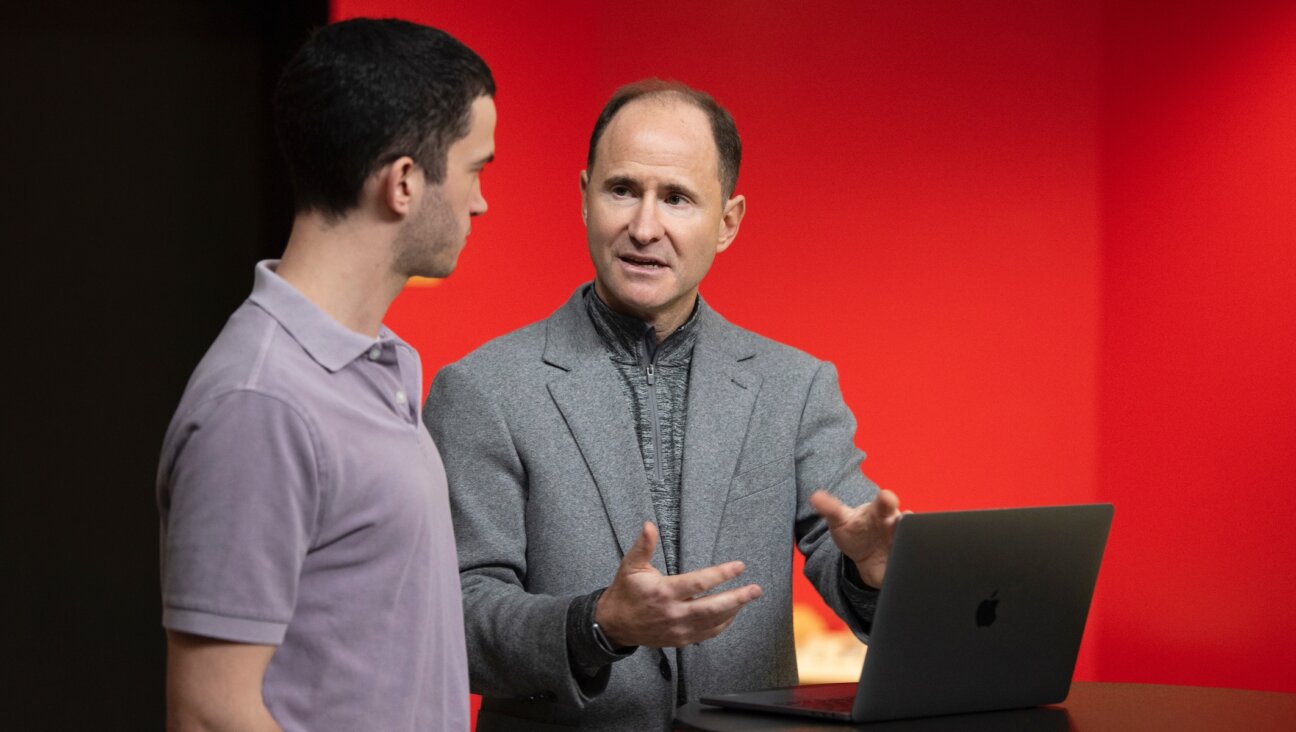
Fast Forward Hillel CEO says he shares ‘concerns’ over campus deportations, calls for due process
-
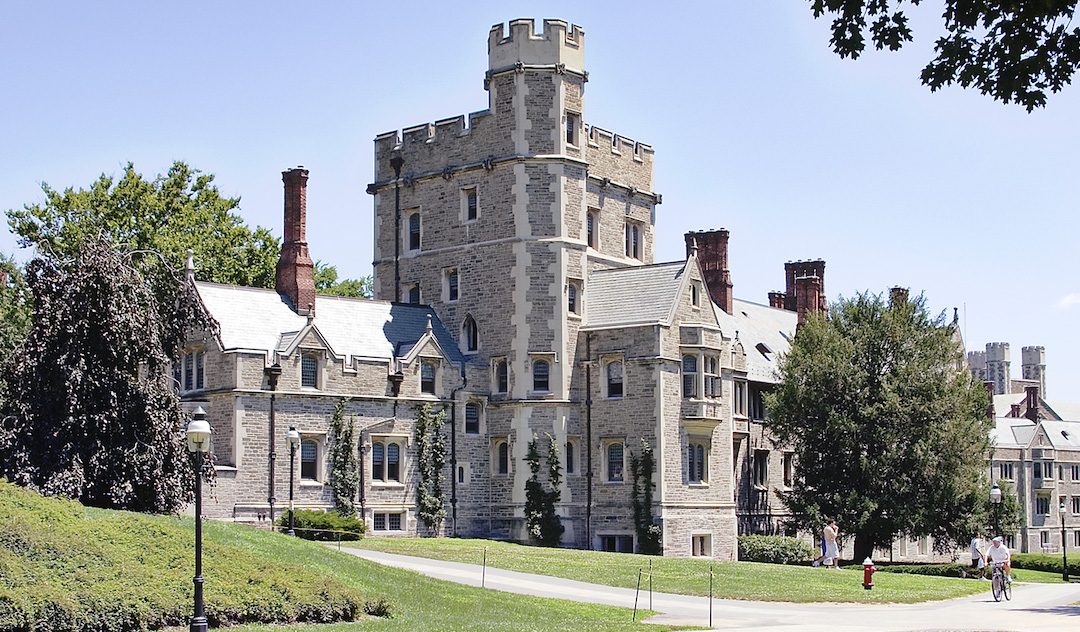
Fast Forward Jewish Princeton student accused of assault at protest last year is found not guilty
-

News ‘Qatargate’ and the web of huge scandals rocking Israel, explained
-
Shop the Forward Store
100% of profits support our journalism
Republish This Story
Please read before republishing
We’re happy to make this story available to republish for free, unless it originated with JTA, Haaretz or another publication (as indicated on the article) and as long as you follow our guidelines.
You must comply with the following:
- Credit the Forward
- Retain our pixel
- Preserve our canonical link in Google search
- Add a noindex tag in Google search
See our full guidelines for more information, and this guide for detail about canonical URLs.
To republish, copy the HTML by clicking on the yellow button to the right; it includes our tracking pixel, all paragraph styles and hyperlinks, the author byline and credit to the Forward. It does not include images; to avoid copyright violations, you must add them manually, following our guidelines. Please email us at [email protected], subject line “republish,” with any questions or to let us know what stories you’re picking up.







